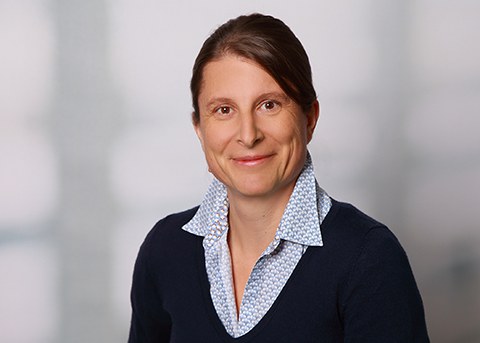Prof. Dr. med. Katharina von Kriegstein
Research focus
- Sensory mechanisms of human communication
- Communication disorders: Dyslexia, Person Identity Recognition Deficits, Autism Spectrum Disorder
- Neuroscience and Behaviour (functional MRI, diffusion MRI, MEG, TMS, eye-tracking)
Inhaltsverzeichnis
Curriculum Vitae
|
von Kriegstein, Katharina, MD, Dr.med., Professor |
|
|
Official position |
Chair of Cognitive and Clinical Neuroscience |
|
Institution |
Technische Universität Dresden Faculty of Psychology |
|
Business address |
Bamberger Str. 7, 01187 Dresden |
Academic education and degrees
|
1993 – 1994 |
Studium generale at Leibniz-Kolleg, Tübingen, Germany |
|
1994 – 2001 |
Medical School, University of Göttingen, Germany; Degree: MD |
|
2000 – 2001 |
Clinical Training, National Hospital for Neurology and Neurosurgery, Hospital Marquez de Valdecilla, Universidad de Santander, Spain; University Hospital Göttingen, Germany |
|
1995 – 1997 |
Study of Philosophy, University of Göttingen, Germany; Degree: Zwischenprüfung |
|
2001 |
Dr.med., University of Göttingen, Germany |
|
2001 – 2004 |
Residency in Neurology, Goethe University, Frankfurt/M., Germany |
Professional career
|
1996 – 2000 |
MD Doctoral Student (Advisors: Prof. TC Südhof, Prof. N Brose, Prof. F Schmitz), Molecular Neurobiology Department, Max-Planck Institute for Experimental Medicine, Göttingen, Germany |
|
2001 – 2004 |
Research Associate (Supervisor: Prof. AL Giraud), Clinic for Neurology, University of Frankfurt/M., Germany |
|
2004 – 2009 |
Postdoc (Advisor: Prof. TD Griffiths), Wellcome Trust Centre for Neuroimaging, University College London, UK |
|
2009 – 2018 |
Max Planck Research Group Leader Max Planck Institute for Human Cognitive and Brain Sciences, Leipzig, Germany |
|
2013 – 2017 |
Professor of Cognitive and Clinical Neurosciences, Institute of Psychology, Humboldt University, Berlin, Germany |
|
Since 2017 |
Professor of Cognitive and Clinical Neuroscience, Faculty of Psychology, Technische Universität Dresden, Germany |
Honors, awards and positions
|
2002 |
Award for best doctoral thesis 2001 in Experimental Medicine, University of Göttingen |
|
2009 |
Max Planck Research Group |
|
2014 |
Max Planck Research Group Work rated as outstanding (best rating) |
|
2015 |
10 most important peer-reviewed papers
(10 out of 80; Publons h-index: 28)
Borowiak K, von Kriegstein K. Intranasal oxytocin modulates brain responses to voice-identity recognition in typically developing individuals, but not in ASD. Transl Psychiatry. 2020;10(1):221.
Tschentscher N, Ruisinger A, Blank H, Díaz B, von Kriegstein K. Reduced Structural Connectivity Between Left Auditory Thalamus and the Motion-Sensitive Planum Temporale in Developmental Dyslexia. J Neurosci. 2019;39(9):1720-1732.
Roswandowitz C, Kappes C, Obrig H, von Kriegstein K. Obligatory and facultative brain regions for voice-identity recognition. Brain. 2018;141(1):234-247.
Müller-Axt C, Anwander A, von Kriegstein K. Altered Structural Connectivity of the Left Visual Thalamus in Developmental Dyslexia. Current Biology. 2017;27(23):3692-3698.e4.
Schelinski S, Borowiak K, von Kriegstein K. Temporal voice areas exist in autism spectrum disorder but are dysfunctional for voice identity recognition. Soc Cogn Affect Neurosci. 2016;11(11):1812-1822.
Blank H, Wieland N, von Kriegstein K. Person recognition and the brain: merging evidence from patients and healthy individuals. Neurosci Biobehav Rev. 2014;47:717-34.
Roswandowitz C, Mathias SR, Hintz F, Kreitewolf J, Schelinski S, von Kriegstein K. Two cases of selective developmental voice-recognition impairments. Current Biology. 2014;24(19),2348-2353.
Diaz B, Hintz F, Kiebel SJ, von Kriegstein K. Dysfunction of the auditory thalamus in developmental dyslexia. Proceedings of the National Academy of Sciences. 2012;109(34),13841-13846.
von Kriegstein K, Dogan Ö, Grüter M, Giraud AL, Kell CA et al. Simulation of talking faces in the human brain. Proceedings of the National Academy of Sciences. 2008;105(18),6747-6752.
von Kriegstein K, Kleinschmidt A, Giraud AL. Voice recognition and cross-modal responses to familiar speakers' voices in prosopagnosia. Cereb Cortex. 2006;16(9):1314-22.

